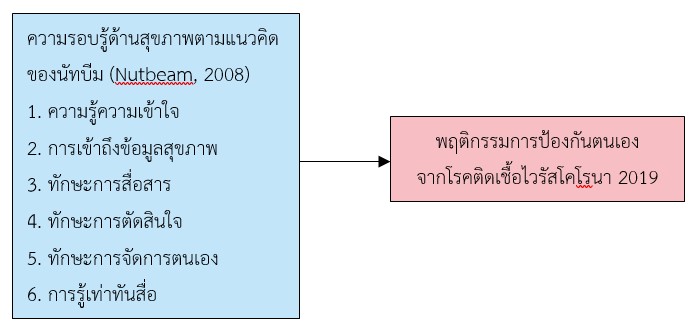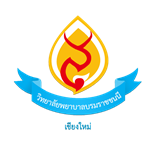The Relationship between Health Literacy and Coronavirus Disease 2019 Prevention Behaviors among Nursing Students, Borommarajonani College of Nursing Chiang Mai
Keywords:
Health Literacy, Prevention Behaviors, Coronavirus Disease 2019, Nursing StudentsAbstract
This cross-sectional study aimed to 1) study the level of health literacy and self-protection behaviors against the coronavirus disease 2019 (COVID-19), 2) compare the levels of health literacy and self-protection behaviors against COVID-19, and 3) study the relationship between health literacy and self-protection behaviors against COVID-19. Participants consisted of 613 students in Boromarajonani College of Nursing, Chiang Mai from the first to the fourth year, specifically selected in the academic year 2020. The research tools included a health literacy assessment and a self-protection behavior assessment against COVID-19. The data were analyzed using descriptive statistics, Kruskal-Wallis test, Wilcoxon Signed-Rank test, and Spearman rank correlation.
The results of the study showed that the overall mean score of health literacy was at a good level (Mean= 77.45, S.D. = 15.42). When comparing health literacy levels by year, first-year students had significantly different health literacy levels compared to third and fourth-year students (p-value < 0.05, p-value < 0.001, respectively). The overall mean score of self-protection behaviors against COVID-19 was at a very good level (Mean= 89.89, S.D. = 13.17). When comparing self-protection behaviors against COVID-19 by year, fourth-year students had significantly different self-protection behaviors against COVID-19 compared to first, second, and third-year students (p-value < 0.01). Health literacy was positively correlated with self-protection behaviors against COVID-19 (r= 0.54, p-value < 0.001). The results of this study could be used to promote health literacy among nursing students, focusing on first-year students' knowledge and understanding to encourage self-protection behaviors against COVID-19.
References
กรมควบคุมโรค. (2563). กรมควบคุมโรค แนะประชาชนเพิ่มระยะห่างทางสังคม “Social Distancing” กับ 8 วิธีป้องกันโรคโควิด-19. สืบค้นเมื่อ 7 เมษายน 2563 จาก https://shorturl.asia/Y59Mk.
กองสุขศึกษา กรมสนับสนุนบริการสุขภาพ กระทรวงสาธารณสุข. (2559). การเสริมสร้างและประเมินความรอบรู้ ด้านสุขภาพและพฤติกรรมสุขภาพกลุ่มเด็กวัยเรียน กลุ่มวัยทำงาน. สืบค้นเมื่อ 7 เมษายน 2563 จาก http://www.hed.go.th/uploads/file/Health%20Listeracy/studywork.pdf.
จิระภา ขำพิสุทธิ์. (2561). ความฉลาดทางสุขภาพ และพฤติกรรมสร้างเสริมสุขภาพของนิสิตมหาวิทยาลัยนเรศวร.วารสารการวัดผลการศึกษา, 24(1), 67-78.
จิระภา ขำพิสุทธิ์. (2564). ความรอบรู้ด้านสุขภาพและพฤติกรรมการป้องกันโรคโควิด 19 ของนักศึกษา คณะศึกษาศาสตร์ วิทยาลัยนอร์ทเทิร์น. วารสารวิชาการสาะรณสุขชุมชน, 7(4), 17-28.
ชินตา เตชะวิจิตรจาร. (2561). ความรอบรู้ทางสุขภาพ: กุญแจสำคัญสู่พฤติกรรมสุขภาพและผลลัพธ์สุขภาพที่ดี. วารสารพยาบาลทหารบก, 19(ฉบับพิเศษ), 1-11.
ณัฐริกา พร้อมพูน, กฤษิณี เหลื่อง, วรางคณา คงสวัสดิ์, กฤติญา เส็งนา และภูษณิศา มีนาเขตร. (2565). ความรอบรู้ทางสุขภาพด้านการป้องกันโรคโควิด-19 และพฤติกรรมสุขภาพแบบชีวิตวิถีใหม่ของนักศึกษาพยาบาล คณะพยาบาลศาสตร์ มหาวิทยาลัยอุบลราชธานี. วารสารสุขภาพและการพยาบาล มหาวิทยาลัยอุบลราชธานี, 1(1), 16-27.
รัศมี สุขนรินทร์, กฤษฎนัย ศรีใจ, จินดา ม่วงแก่น และวรัญญ์ศิชา ทรัพย์ประเสริฐ. (2565). พฤติกรรมการป้องกันโรคโควิด-19 ของนักศึกษาวิทยาลัยการสาธารณสุขสิรินธร จังหวัดพิษณุโลก. วารสารควบคุมโรค, 48(3), 484-492.
วิชัย เทียนถาวร และณรงค์ ใจเที่ยง. (2564) .ความรอบรู้ด้านสุขภาพกับพฤติกรรมการป้องกันโควิด 19 ในกลุ่มวัยเรียนมหาวิทยาลัยแห่งหนึ่ง. วารสารสาธารณสุขและวิทยาศาสตร์สุขภาพ, 4(2), 126-137.
หยาดพิรุณ ศิริ, อธิวัต อาจหาญ และนิรชร ชูติพัฒนะ. (2565). ความรอบรู้ด้านสุขภาพและพฤติกรรมป้องกันโรคโควิด-19 ของนักศึกษามหาวิทยาลัยแห่งหนึ่งในภาคใต้. วารสารควบคุมโรค, 48(3), 493-504.
อภิชา อินสุวรรณ, ณัฐหรินทร์ แพทยานนท์, ฐิติพร ฐิติจำเริญพร และปนัดดา เดชวงศ์ญา. (2561). การจัดการศึกษาเพื่อพัฒนาทรัพยากรมนุษย์ในแต่ละช่วงวัยบนพื้นฐานของแผนพัฒนาเศรษฐกิจและสังคมแห่งชาติ ฉบับที่ 12 และไทยแลนด์ 4.0 โมเดล. วารสารมหาวิทยาลัยพายัพ, 28(2), 21-39.
อลงกรณ์ สุขเรืองกูล, จักรพันธ์ โพธิภาพ, วสันต์ชาย สุรมาตย์, มณฑิรา ชนะกาญจน์, กัลยา ปังประเสริฐ และเพชรัตน์ ศิริสุวรรณ. (2565). ปัจจัยที่มีความสัมพันธ์กับความรอบรู้ด้านสุขภาพ ของนักศึกษา คณะพยาบาลศาสตร์ วิทยาลัยบัณฑิตเอเซีย จังหวัดขอนแก่น. วารสารศูนย์อนามัยที่ 9, 16(1), 156-171.
Cascella, M., Rajnik, M., Aleem, A., Dulebohn, S. C., & Di Napoli, R. (2023). Features, Evaluation, and Treatment of Coronavirus (COVID-19). In StatPearls. StatPearls Publishing.
Dong, L., & Bouey, J. (2020). Public mental health crisis during COVID-19 pandemic, China. Emerging Infectious Diseases, 26(7), 1616-1618. https://doi.org/10.3201/eid2607.200407
Hange, N., et al. (2022). Impact of COVID-19 response on public health literacy and communication. Health Promotion Perspectives, 12(1), 1-9. https://doi.org/10.34172/hpp.2022.01
Nutbeam, D. (2008). The evolving concept of health literacy. Social Science & Medicine, 67(12), 2072-2078. https://doi.org/10.1016/j.socscimed.2008.09.050
Tao, Z., et al. (2023). Relationship between health literacy and COVID-19 knowledge: A cross-sectional study. Frontiers in Public Health, 11, 1058029. https://doi.org/10.3389/fpubh.2023.1058029

Downloads
Published
How to Cite
Issue
Section
License
Copyright (c) 2024 Journal of Nursing and Public Health Research

This work is licensed under a Creative Commons Attribution-NonCommercial-NoDerivatives 4.0 International License.
1. บทความหรือข้อคิดเห็นใด ๆ ที่ปรากฏในวารสารวิจัยการพยาบาลและการสาธารณสุข ที่เป็นวรรณกรรมของผู้เขียน บรรณาธิการไม่จำเป็นต้องเห็นด้วย
2. บทความที่ได้รับการตีพิมพ์ถือเป็นลิขสิทธิ์ของ วารสารวิจัยการพยาบาลและการสาธารณสุข








